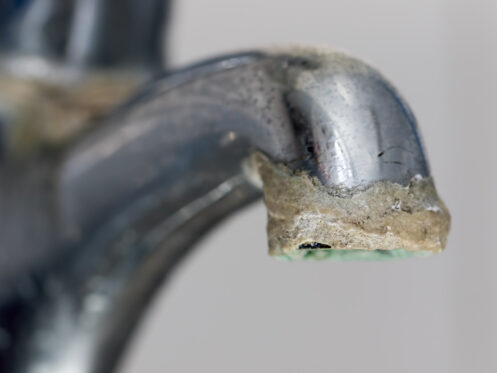A water’s hardness is determined by the amount of minerals dissolved within it. Typically, the primary hard minerals present are calcium and magnesium. Water is generally classified as soft, moderately hard, or hard. Most residents in the United States have water that’s at least moderately hard. To lower the mineral content in your drinking water, it’s recommended to invest in a whole-home water softener. Here’s what you need to know about your home’s water hardness and how to protect your fixtures and plumbing.
Causes Behind Water Hardness
Groundwater naturally collects minerals on its way to local rivers and lakes. Calcium carbonate comes from the water running through limestone. Magnesium, on the other hand, is found in underground deposits of dolomite and magnetite. These minerals are common in much of the country and especially in mountainous regions. The water collects minerals on its way to the closest major water source, where it’s then collected by your local provider.
Water companies will screen for pollutants and debris, but they don’t traditionally remove calcium or magnesium. While long-term exposure to hard water can harm your pipes, it won’t have a significant negative impact on your health. Your water’s overall hardness level can also vary based on the condition of your pipes and your location.
Signs of Hard Water
Hard water is often the culprit behind a host of home plumbing issues. When appliances go on the fritz or you notice strange changes in your water pressure, be sure to consider your water’s hardness. One of the easiest signs to spot is excess mineral buildup on your tub and sink spouts. The water may come out clear, but once it dries, it will turn to a crusty white color. These deposits can be difficult to scrub away and can quickly accumulate.
You may also find that you struggle to get a good lather going. Hard water isn’t as effective as soft water at breaking down your soap. This makes it harder for you to shower, wash dishes, or clean. You’ll likely also notice that appliances like your dishwasher and washing machine aren’t as effective as they should be. Without an efficient lather, more soap scum will linger on your clothes, dishes, bathroom tiles, and tub. The scummy residue will also coat your shower walls and door with an unpleasant thick film.
There’s a chance your low water pressure could be because of your hard water. You’ll first want to make sure you’re not grappling with a water heater issue or a partially closed water shut-off valve. If you can’t easily find the source, it’s possible your problem could be linked to mineral buildup in the pipes. This issue can even exacerbate the debris accumulation in your water heater, leading to energy efficiency and pressure concerns.
Finally, your hard water can impact your household’s comfort. Frequent exposure may leave you with dry, irritated, or inflamed skin. You could find your hair lacks luster or may not be as healthy as before. Hard water isn’t the same as contaminated water and won’t harm you internally. However, it can leave you feeling uncomfortable and dirty even when you’ve recently bathed. The only way to stop hard water from wreaking havoc is to consider a whole-home solution like a water softener.
Best Hard Water Solution: Water Softeners
Water softeners utilize basic chemistry to remove hard minerals from your water. Calcium and magnesium ions have a positive charge and are naturally attracted to negative charges. Water softeners contain a chamber with negatively charged resin beads. Your water flows into the system and through the beads, which trap the hard minerals. The water that leaves your softener is then safer for your pipes and appliances.
To ensure the beads are always efficiently charged, they need to be regularly flushed or regenerated. Softeners come with a separate brine tank full of sodium pellets that help to wash away the hard minerals. The frequency of regeneration typically varies based on the system. Your softener may rinse the beads on a fixed schedule or after your home has used a specific amount of water. New smart models can enable you to trigger a regeneration manually. These models also make it easier to monitor your salt level and receive updates on when it’s time to refill the brine tank.
It’s important to recognize that softening your water is different from conditioning or filtering it. Softening systems directly tackle water hardness and its side effects like mineral buildup and decreased lather. Water filtration focuses on removing contaminants like sediment, bacteria, heavy metals, and more from your drinking water. Some softening systems may have filtration capabilities, but they generally focus on different problems with your water.
Conditioning refers to a general improvement of your water quality. Essentially, water softeners are a form of conditioning system, but not every conditioning system is a softener. There are salt-free softeners, for example, that can help with your hard water without the use of sodium pellets. To find the best solution for your home, you should consult with a professional for a hard water test.
Facts About Water Softeners
Water softeners require minimal maintenance over the years. The most frequent care you’ll need to complete is adding more salt to the system. Advanced smart systems can keep track of when something has gone wrong and you need service. Some even offer remote troubleshooting options depending on the model. If you opt for a standard softener, you’ll have to keep manual track of its maintenance needs. Ideally, you’ll bring in an expert about once a year to ensure the system is in good shape.
When cared for effectively, your water softener can last for decades. Specific factors that can impact its lifespan include how often it’s used and the hardness of your water. For example, if you live in an area with extremely hard water, your softener is more likely to give out earlier. Well water may also shorten your unit’s lifespan prematurely.
Installing a water softener is a home project best left to the experts. These systems require connecting drain lines, cutting and adding pipes, and more. You’ll also need to make sure you get the right size system for your household’s water needs. Making a mistake during the installation process could leave you with an ineffective system that doesn’t address your hard water issue.
When choosing your ideal softener, you should keep in mind your ideal functions, hardness level, and capacity. Local plumbing companies carry the best systems available with superior energy efficiency ratings and softening capabilities. Additionally, you’ll be given the chance to take advantage of their labor and system warranties that can help you with unexpected service needs.
Family-Owned Plumbing and Heating Company
F.F. Hitchcock Plumbing, Heating & Cooling has been a well-trusted indoor comfort company in Cheshire, CT since 1870. Our staff always arrives in fully stocked trucks ready to handle your plumbing, heating, or cooling issues. Let us expertly clean the debris from your drains or replace your key fixtures. We offer water heater and water treatment services you don’t want to miss. You can also keep us in mind for HVAC repairs and tune-ups. Call us today to learn more.







